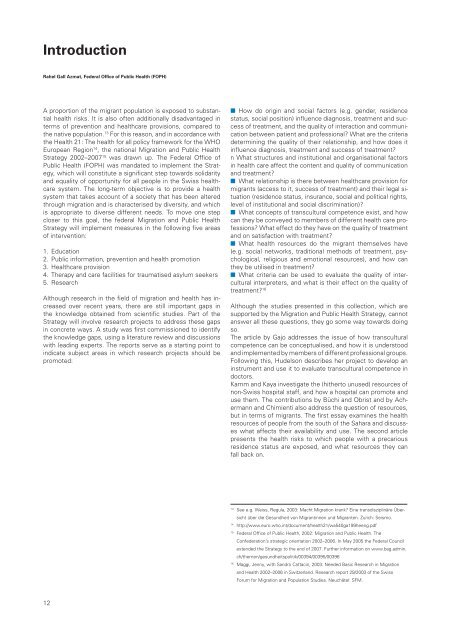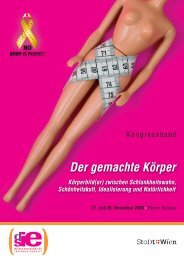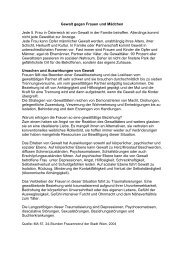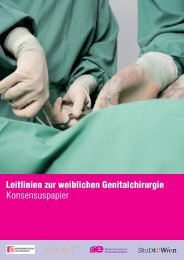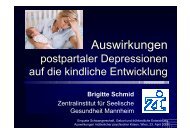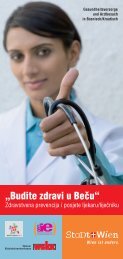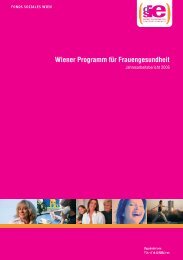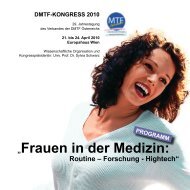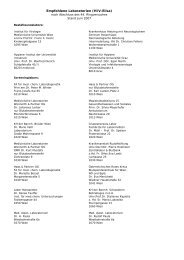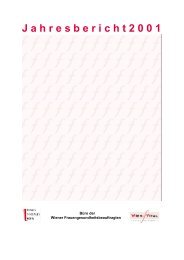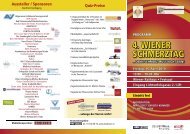Forschung Migration und Gesundheit im Rah - Bundesamt für ...
Forschung Migration und Gesundheit im Rah - Bundesamt für ...
Forschung Migration und Gesundheit im Rah - Bundesamt für ...
Create successful ePaper yourself
Turn your PDF publications into a flip-book with our unique Google optimized e-Paper software.
Introduction<br />
<strong>Rah</strong>el Gall Azmat, Federal Office of Public Health (FOPH)<br />
A proportion of the migrant population is exposed to substantial<br />
health risks. It is also often additionally disadvantaged in<br />
terms of prevention and healthcare provisions, compared to<br />
the native population. 13 For this reason, and in accordance with<br />
the Health 21: The health for all policy framework for the WHO<br />
European Region 14 , the national <strong>Migration</strong> and Public Health<br />
Strategy 2002–2007 15 was drawn up. The Federal Office of<br />
Public Health (FOPH) was mandated to <strong>im</strong>plement the Strategy,<br />
which will constitute a significant step towards solidarity<br />
and equality of opportunity for all people in the Swiss healthcare<br />
system. The long-term objective is to provide a health<br />
system that takes account of a society that has been altered<br />
through migration and is characterised by diversity, and which<br />
is appropriate to diverse different needs. To move one step<br />
closer to this goal, the federal <strong>Migration</strong> and Public Health<br />
Strategy will <strong>im</strong>plement measures in the following five areas<br />
of intervention:<br />
1. Education<br />
2. Public information, prevention and health promotion<br />
3. Healthcare provision<br />
4. Therapy and care facilities for traumatised asylum seekers<br />
5. Research<br />
Although research in the field of migration and health has increased<br />
over recent years, there are still <strong>im</strong>portant gaps in<br />
the knowledge obtained from scientific studies. Part of the<br />
Strategy will involve research projects to address these gaps<br />
in concrete ways. A study was first commissioned to identify<br />
the knowledge gaps, using a literature review and discussions<br />
with leading experts. The reports serve as a starting point to<br />
indicate subject areas in which research projects should be<br />
promoted:<br />
12<br />
How do origin and social factors (e.g. gender, residence<br />
status, social position) influence diagnosis, treatment and success<br />
of treatment, and the quality of interaction and communication<br />
between patient and professional? What are the criteria<br />
determining the quality of their relationship, and how does it<br />
influence diagnosis, treatment and success of treatment?<br />
n What structures and institutional and organisational factors<br />
in health care affect the content and quality of communication<br />
and treatment?<br />
What relationship is there between healthcare provision for<br />
migrants (access to it, success of treatment) and their legal situation<br />
(residence status, insurance, social and political rights,<br />
level of institutional and social discr<strong>im</strong>ination)?<br />
What concepts of transcultural competence exist, and how<br />
can they be conveyed to members of different health care professions?<br />
What effect do they have on the quality of treatment<br />
and on satisfaction with treatment?<br />
What health resources do the migrant themselves have<br />
(e.g. social networks, traditional methods of treatment, psychological,<br />
religious and emotional resources), and how can<br />
they be utilised in treatment?<br />
What criteria can be used to evaluate the quality of intercultural<br />
interpreters, and what is their effect on the quality of<br />
treatment? 16<br />
Although the studies presented in this collection, which are<br />
supported by the <strong>Migration</strong> and Public Health Strategy, cannot<br />
answer all these questions, they go some way towards doing<br />
so.<br />
The article by Gajo addresses the issue of how transcultural<br />
competence can be conceptualised, and how it is <strong>und</strong>erstood<br />
and <strong>im</strong>plemented by members of different professional groups.<br />
Following this, Hudelson describes her project to develop an<br />
instrument and use it to evaluate transcultural competence in<br />
doctors.<br />
Kamm and Kaya investigate the (hitherto unused) resources of<br />
non-Swiss hospital staff, and how a hospital can promote and<br />
use them. The contributions by Büchi and Obrist and by Achermann<br />
and Ch<strong>im</strong>ienti also address the question of resources,<br />
but in terms of migrants. The first essay examines the health<br />
resources of people from the south of the Sahara and discusses<br />
what affects their availability and use. The second article<br />
presents the health risks to which people with a precarious<br />
residence status are exposed, and what resources they can<br />
fall back on.<br />
13 See e.g. Weiss, Regula, 2003: Macht <strong>Migration</strong> krank? Eine transdisziplinäre Übersicht<br />
über die Ges<strong>und</strong>heit von Migrantinnen <strong>und</strong> Migranten. Zurich: Seismo.<br />
14 http://www.euro.who.int/document/health21/wa540ga199heeng.pdf<br />
15 Federal Office of Public Health, 2002: <strong>Migration</strong> and Public Health. The<br />
Confederation’s strategic orientation 2002–2006. In May 2005 the Federal Council<br />
extended the Strategy to the end of 2007. Further information on www.bag.admin.<br />
ch/themen/ges<strong>und</strong>heitspolitik/00394/00395/00396<br />
16 Maggi, Jenny, with Sandro Cattacin, 2003: Needed Basic Research in <strong>Migration</strong><br />
and Health 2002–2006 in Switzerland. Research report 29/2003 of the Swiss<br />
Forum for <strong>Migration</strong> and Population Studies. Neuchâtel: SFM.


